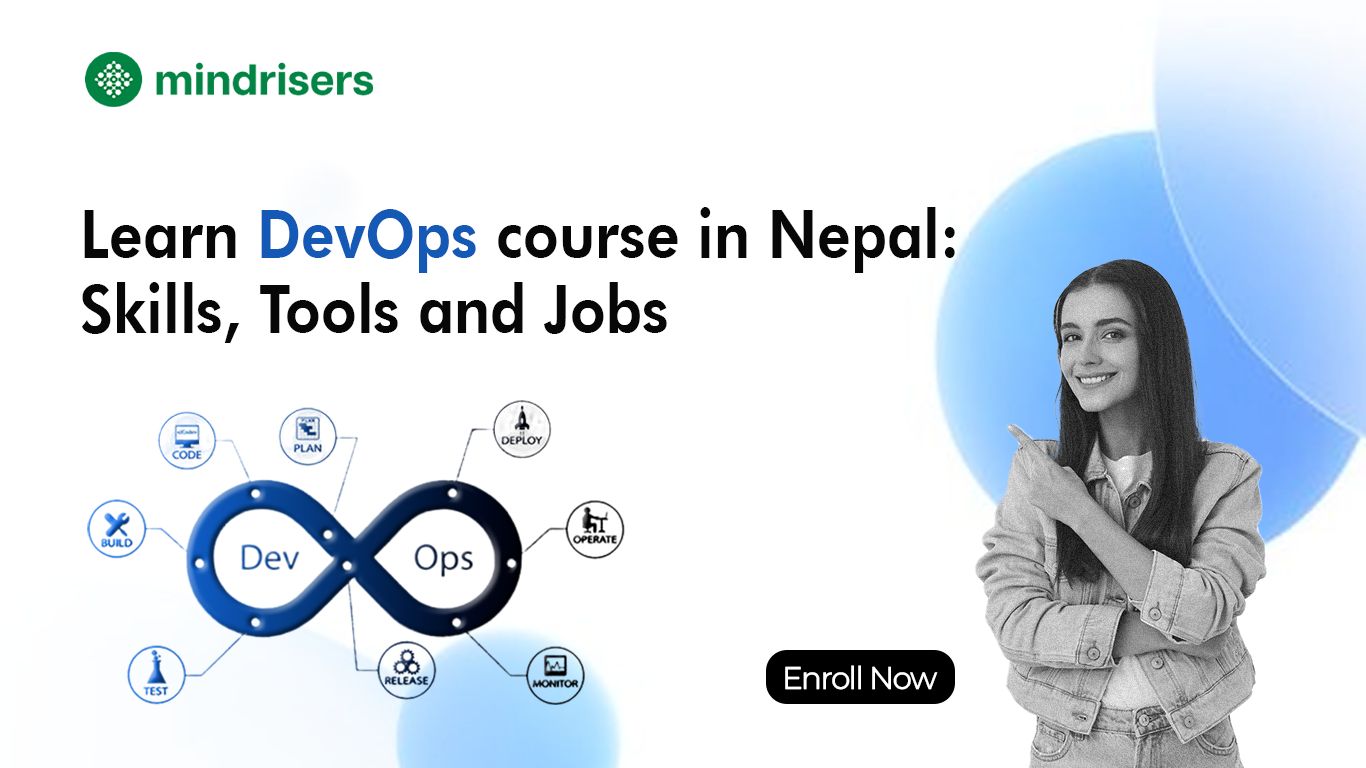
Rupesh Basnet - Author
2025-07-28
With Nepal's growing digital economy, the need for effective software delivery and agile infrastructure has put DevOps at the center of contemporary IT operations. DevOps is not a fad, but a cultural and technical movement that advocates cooperation between developers and operations staff to improve software development cycles without compromising on stability and security. For any aspiring professional looking to excel in cloud computing, automation, and software engineering, DevOps is no longer an optional skillset but a mandatory one.
A well-structured DevOps course allows you to build foundational and advanced-level skills ranging from version control with Git to automation with Jenkins to cloud-native deployment with Docker and Kubernetes. You also learn about crucial concepts like infrastructure as code (IaC) using tools like Terraform, continuous monitoring with Prometheus/Grafana, and architecting CI/CD pipelines that power real-world development workflows. Such skill sets are in enormous demand not only in Nepal but also in global tech markets.
The professional prospects for DevOps practitioners are growing rapidly. Some of the most in-demand and highest-paying jobs in the tech field are DevOps Engineer, Automation Specialist, Cloud DevOps Architect, and SRE (Site Reliability Engineer). Whether you are a computer science student, system administrator, or developer aspiring to transition into DevOps, the right training can accelerate your path to success.
That is where Mindrisers Institute of Technology steps in. With its reputation for industry-driven curriculum and learning by doing through projects, Mindrisers offers one of the most hands-on DevOps courses in Nepal. Not only is the course updated with the latest tools, but it also gets you ready with real-world deployment cases, mentorship, and career support that match global DevOps standards.
DevOps Roadmap from Beginners to Professionals
Starting a career in DevOps might be daunting because of the broad spectrum of skills and tools. A definitive DevOps roadmap assists students and professionals alike to chart their course step-by-step, moving from the basics to being highly skilled. Following is an extensive roadmap to lead the way:
-
Learn the Fundamentals of IT Operations and Software Development
Begin by developing a firm understanding of software development life cycles (SDLC), Agile methodologies, and fundamental system administration principles. Understanding how development and operations normally function will assist you in appreciating why DevOps is revolutionary.
-
Learn Version Control Systems
Mastering version control. Version control systems like Git allow teams to collaborate smoothly, track changes, and keep code repositories, one of the core pillars of DevOps practices.
-
Get immersed in Continuous Integration/Continuous Deployment (CI/CD)
Research automation tools like Jenkins, GitLab CI, and Travis CI to learn how code is automatically built, tested, and deployed. The configuration of pipelines is the secret to faster delivery cycles.
-
Get Hands-On with Containerization and Orchestration
Learn Docker to build lightweight, portable application containers. Then advance to Kubernetes, the industry standard for deploying containerized applications at scale.
-
Master Infrastructure as Code (IaC)
Acquire the ability to provision and manage infrastructure through code using tools such as Terraform, Ansible, or AWS CloudFormation. This competency guarantees consistency, repeatability, and versioning in infrastructure management.
-
Get Acquainted with Cloud Platforms
Get hands-on experience with cloud services in AWS, Azure, or Google Cloud Platform. Cloud platforms are a crucial part of modern DevOps setups, providing scalable, adaptable infrastructure.
-
Comprehend Monitoring, Logging, and Security
Learn to set up monitoring with tools such as Prometheus and visualization using Grafana. Logging using the ELK Stack (Elasticsearch, Logstash, Kibana) and incorporating security practices in your pipelines guarantees strong system health and compliance.
-
Develop Scripting and Automation Skills
Skill in scripting languages like Python, Bash, or PowerShell allows for the automation of routine tasks and integration of various tools.
-
Adopt Collaboration and Agile Methodologies
Since DevOps is as much about culture as technology, embrace agile work processes, effective communication, and continuous feedback mechanisms within teams.
By pursuing this roadmap systematically, you build your expertise to be suitable for roles ranging from Junior DevOps Engineer to Senior Architect.
Key Skills Every DevOps Engineer Must Master
It requires a unique blend of technical expertise, problem-solving abilities, and collaboration to be a successful DevOps engineer. DevOps engineers act as the interface between software development teams and IT operations to achieve faster and more reliable software delivery. To excel in this role, it is essential to learn the following key skills:
-
Continuous Integration and Continuous Deployment (CI/CD):
Understanding CI/CD pipelines is fundamental for automating the software release process. Tools like Jenkins, GitLab CI, and CircleCI help automate testing, integration, and deployment, reducing errors and accelerating delivery.
-
Containerization and Orchestration:
Containerization technologies such as Docker offer DevOps engineers the capability to package applications and their dependencies into portable environments. Orchestration tools such as Kubernetes enable clusters of containers to be managed, offering scalability and availability.
-
Infrastructure as Code (IaC):
Programmatic management of infrastructure with tools such as Terraform, Ansible, and CloudFormation retains consistency and speed in configuration and provisioning. IaC reduces human errors and makes infrastructure scaling easier.
-
Cloud Platforms and Services:
Cloud environments expertise empowers the engineers. Knowledge of AWS DevOps, Microsoft Azure, or Google Cloud Platform gives developers the ability to deploy and manage applications in scalable, secure, and cost-effective manners.
-
Monitoring and Logging:
Proactive monitoring with the help of tools like Prometheus, Grafana, and ELK Stack (Elasticsearch, Logstash, Kibana) allows DevOps engineers to identify and resolve issues before they impact users, thereby ensuring high availability and reliability.
-
Scripting and Automation:
Robust scripting capabilities in Python, Bash, or PowerShell allow for the automation of routine tasks, which increases efficiency and minimizes the need for manual intervention.
-
Collaboration and Communication:
As DevOps is focused on cultural transformation, engineers are required to communicate well between teams, promote collaboration, and adopt agile principles for continuous improvement.
Acquiring these skills not only enhances your potential as a DevOps engineer but also highly elevates your market value. The demand for experienced DevOps engineers is escalating swiftly in Nepal as well as globally, as organizations aim to innovate quickly alongside system stability.
AWS DevOps: How the Amazon Cloud Supports DevOps Workflows
Amazon Web Services (AWS) has become a cornerstone for DevOps-implementing organizations due to its robust cloud infrastructure and comprehensive toolset focused on automating and streamlining development and operations processes. AWS DevOps integrates cloud computing and DevOps practices to enable teams to build, test, and deploy applications faster, more reliably, and at scale.
AWS provides extensive services for DevOps practices. In continuous integration and continuous delivery (CI/CD), AWS CodePipeline, CodeBuild, and CodeDeploy enable effortless automation of build, test, and deployment phases. They provide fast feedback cycles, minimize manual errors, and enhance software quality.
Infrastructure as Code (IaC) is made easy with AWS CloudFormation, which allows engineers to declare and provision infrastructure using code templates for consistency and version control. With AWS Elastic Container Service (ECS) and Elastic Kubernetes Service (EKS), AWS also supports container orchestration for managing scalable applications with ease.
Monitoring and logging are essential for DevOps, and AWS offers services such as CloudWatch and AWS X-Ray to monitor application performance, identify anomalies, and debug problems in real-time. Security and compliance are also built in with AWS Identity and Access Management (IAM), which simplifies the implementation of role-based access and protection of environments.
By utilizing AWS, DevOps engineers in Nepal and other places can reduce infrastructure management overheads, focus more on application innovation, and accelerate release cycles. Gaining AWS DevOps competencies is increasingly essential for engineers who wish to handle modern cloud-native applications and scalable infrastructure.
Common Mistakes Beginners Make on the DevOps Journey
Embarking on your DevOps journey can be invigorating yet overwhelming, and most learners make rookie mistakes without realizing it, which hinders their learning or causes setbacks. Being aware of these traps beforehand can save you time and ensure that you establish a solid foundation. The following are the mistakes that newcomers make on their DevOps journey:
-
Focusing Only on Tools, Not Culture
DevOps is as much about culture and collaboration as about technology. Newbies jump headlong into tool learning without understanding the mindset change that must occur to remove silos between development and operations teams. To be successful at DevOps, there must be an embracing of communication, continuous feedback, and shared responsibility.
-
Ignoring Automation Best Practices
While automation is a core DevOps principle, automating poorly designed processes will create more harm than good. Beginners tend to automate manual, inefficient processes without streamlining them first, leading to fragile pipelines and frequent pipeline failures.
-
Neglecting Security Early On
Security must be integrated from the beginning (DevSecOps), yet newcomers tend to postpone it. This results in vulnerabilities and compliance issues that are costly to fix further down the road.
-
Over-engineering CI/CD Pipelines
Pipelines can seem cool when they're complicated, but overly complicated pipelines with redundant steps or manual interventions are typically created by novices. Simple pipelines that are modular and easy to maintain equate to faster builds and deployments.
-
Skipping Monitoring and Feedback Loops
If you don't have monitoring and feedback, you can't tell whether your deployments are working or if something goes wrong after release. Newbies might forget to configure monitoring tools or check logs, so problems aren't discovered until later.
-
Not Spending Enough Time Learning Infrastructure as Code (IaC)
IaC is necessary for scalability and consistency, yet beginners underestimate its importance or avoid learning it due to the steep learning curve at the beginning. Failure to use IaC may result in manual configuration errors and environment incompatibilities.
-
Underestimating the Value of Collaboration Tools
DevOps feeds on collaboration. Forgetting about collaboration tools like Slack, Jira, or Confluence can retard communication and project development.
Understanding and avoiding these common mistakes will accelerate your learning process and enable you to be a more effective DevOps engineer. Remember, DevOps is a journey of continuous improvement, and learning from early failures is part of the process.
Conclusion
DevOps is revolutionizing the way organizations construct, deploy, and manage software, and hence is an essential skill for IT professionals in Nepal and abroad. With the acquisition of the appropriate skills, adherence to a well-planned roadmap, and steering clear of typical blunders, you can become a worthy DevOps engineer who can hasten development cycles and enhance system reliability.
Training institutes such as Mindrisers Institute of Technology provide industry-recognized courses that include hands-on training on essential tools and real-life projects so that you are job-ready. Adopting both the technical and cultural concepts of DevOps will make you flourish in today's hyper-speed technology world and have a fulfilling career.
FAQs
-
What is DevOps?
DevOps is a practice that combines software development and IT operations for faster and more reliable software delivery.
-
What are the skills needed for a DevOps engineer?
The major skills are CI/CD, containerization, infrastructure as code, cloud platforms, automation, and collaboration.
-
How can I learn DevOps in Nepal?
Take a formal DevOps course such as those provided by Mindrisers Institute of Technology for practical study.
-
What is the DevOps roadmap for beginners?
It entails learning development fundamentals, version control, CI/CD, containerization, IaC, cloud services, and monitoring.
-
Why is AWS important in DevOps?
AWS offers cloud infrastructure and services that automate and streamline DevOps workflows quite well.
-
What are some pitfalls that beginners make in DevOps?
Newbies tend to concentrate just on tools, ignore security, omit monitoring, and complicate pipelines excessively.
-
What are the job positions I can acquire after learning DevOps?
Roles include DevOps Engineer, Site Reliability Engineer (SRE), Cloud Architect, and Automation Specialist.
-
Is DevOps training worth it for IT professionals in Nepal?
Yes, DevOps skills greatly boost career prospects and earning potential in Nepal's emerging tech sector.
Recent
- 01Affordable vs Expensive IT Institutes in Nepal: How to Select the Best IT Institute in Nepal?
- 02EEAT Model Explained: How it Improves SEO (Beginners Guide)
- 03How to choose the Best IT institute in Nepal for Beginners?
- 04Generative Engine Optimization (GEO) in 2025 and beyond: A Complete Beginner-Friendly Guide
Recent Post
View All
Affordable vs Expensive IT Institutes in Nepal: How to Select the Best IT Institute in Nepal?
2026-01-19.462 Views
EEAT Model Explained: How it Improves SEO (Beginners Guide)
2026-01-05.595 Views
How to choose the Best IT institute in Nepal for Beginners?
2026-01-01.552 Views
Generative Engine Optimization (GEO) in 2025 and beyond: A Complete Beginner-Friendly Guide
2025-12-02.959 Views
Never miss an Opportunity !
Want to learn TOP 2025 IT Skills ?
We open IT skill classes Monthly in Design, Development, Deployment, Data etc.
Have something to Ask ?
get admission enquiry